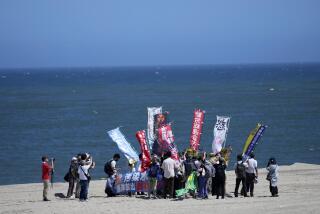Radiation: In airports, not in Japan
- Share via
As people around the world keep an eye on the radiation escaping from the Fukushima Nuclear Plant in Japan, two experts offer differing views on the danger posed by the radiation that American fliers are exposed to when they walk through whole-body scanners in U.S. airports.
In the April issue of the journal Radiology, David A. Schauer, executive director of the National Council on Radiation Protection and Measurements, suggests that the risk to individuals may be worth the benefit for society.
Also in that issue, David J. Brenner, director of the Center for Radiological Research at Columbia University Medical Center in New York, says that, while individual risk may be close to zero, population risk is significant -- and thus the TSA should opt for scanners that don’t use X-rays.
Brenner calculates that, because the TSA could perform about a billion scans a year, even if the two scans needed for round-trip travel pose only a one-in-a-million chance of developing cancer for an individual, some people would still get sick from the scans.
“When the number of exposures is extraordinarily large, the argument that “if the risk of harm to the health of the most exposed individuals is trivial, then the total [population] risk is trivial -- irrespective of how many people are exposed” can no longer be valid,” he writes.
But Schauer, who notes that patients receiving radiological medical exams get doses of radiation that are “orders of magnitude” larger, says such a calculation is flawed. “Use of a single value for collective dose can lead to a lack of acceptance of any avoidable risk from radiation exposure, regardless of offsetting benefits,” he writes.
Food for thought, as the run on potassium iodide pills by people afraid of the radiation from Japan continues at U.S. pharmacies. The risk of getting cancer from airport scanners is minute. Still, it may be more real for most Americans than any threat from crippled Japanese nuclear plants.
Related: The Los Angeles Times explains risks posed by radiation from the nuclear accident in Japan
Related: Why you might not want to rush out for those potassium iodide pills
Related: Officials downplay the threat to Americans from Japanese nuclear crisis
Related: How Japanese are calculting the threat they face from nuclear disaster







